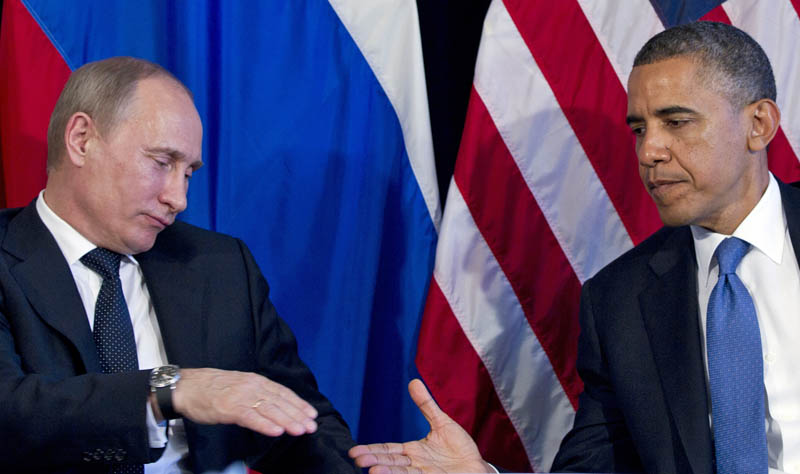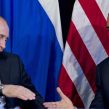
Moscow Elated with a Diplomatic Scoop on Syria
Publication: Eurasia Daily Monitor Volume: 10 Issue: 161
By:

Moscow was elated by the success of an unexpected diplomatic initiative this week on Syria that has postponed indefinitely a seemingly inevitable military assault by the United States. The strike would have been aimed at punishing the forces of Syrian president Bashar al-Assad for using chemical weapons to attack a Damascus suburb on August 21, allegedly killing hundreds of civilians. On Monday, September 9, after intensive negotiations in Moscow with a Syrian government delegation led by Foreign Minister Walid al-Moualem, Russia’s foreign ministry chief, Sergei Lavrov, told journalists that Syria must agree to place its chemical arsenal under “international control” and eventually destroy it after signing and ratifying the Chemical Weapons Convention and joining the Organization for the Prohibition of Chemical Weapons (OPCW) (https://www.interfax.ru/world/txt.asp?id=327989). Al-Moualem and the government in Damascus promptly agreed to disclose the Syrian chemical arsenal, place it under “international control” and eventually destroy it. Lavrov disclosed that Presidents Vladimir Putin and Barack Obama discussed the idea of placing Syria’s chemical weapons under international control on the sidelines of the G20 summit in St. Petersburg last week and that the “Russian initiative on Syria is not entirely Russian” (https://www.interfax.ru/print.asp?sec=1446&id=328121).
Obama, on September 10, publicly supported the “Russian chemical initiative” and announced an apparently indefinite postponement of any plans to use force to punish the al-Assad regime for gas attacks against rebels and civilians. The US Congress has been asked by the White House and, seemingly, gladly agreed to postpone its discussion of a resolution supporting US military action against al-Assad to deter further chemical attacks. Lavrov and US Secretary of State John Kerry will be meeting in Geneva on September 12 and 13 to discuss a Russian plan to solve the Syrian chemical weapons problem. Lavrov declared as “unacceptable” a previous French United Nations Security Council draft resolution demanding that Syria, within 15 days, open to international inspection all its chemical weapons arsenals, industrial and research facilities or face punitive action “under Chapter VII of the UN Charter” (https://www.interfax.ru/print.asp?sec=1446&id=328185). Chapter VII implies the use of military force to which Moscow continues to be adamantly opposed. “The Russian initiative could work only if the US and its allies renounce the use of force,” Putin told journalists, adding, “Syria or any other state will not disarm unilaterally, if threatened by punitive action” (https://ria.ru/arab_riot/20130910/962300848.html#ixzz2ech6hoL8).
Moscow has taken the political initiative and has saved a reluctant Obama from taking military action he never wanted to take, imply Russian commentators. Obama’s national address on Syria on September 10 is depicted as full of contradictions, unfocused, “the worst of his career” and “a birthday present to al-Assad,” who turned 48 on September 11. Obama has disappointed allies and emboldened opponents (https://ria.ru/analytics/20130911/962517090.html#ixzz2echF5ele). Obama has dragged his feet, postponing military action, deliberately shoved the decision onto a reluctant Congress and his administration’s attempts to lobby on Capitol Hill were pathetic. The US is a declining world power unable and unwilling to do anything. Russian diplomacy scored a dramatic victory, luckily exploiting US weakness, reinforced the al-Assad regime and, by “saving Obama” from taking action, may substantially improve its standing in Washington (https://ria.ru/analytics/20130911/962453638.html#ixzz2efTUP8gy).
According to Russian diplomatic sources, the Russian plan on Syrian chemical weapons includes four stages: 1) Syria joins the OPCW after signing and ratifying the Chemical Weapons Convention; 2) declares its chemical weapon stockpiles and production sites; 3) invites OPCW inspectors; 4) and decides together with the OPCW how to destroy its chemical capabilities. Moscow and Washington may provide technical and financial aid to the Syrian authorities during the chemical weapons destruction process. The agreement to destroy al-Assad’s chemical arsenal could be legalized by a UN Security Council resolution that will not contain any ultimatums or the threat of force (https://www.kommersant.ru/doc/2276792/).
The official public disclosure of a previously secret Syrian chemical weapons stockpile and production program, if it eventually happens, is indeed an important step forward, but the safe dismantling of the weapons of mass destruction (WMD) capability within a war-ravaged nation is a logistical nightmare. Burning hundreds (or thousands) of tons of nerve and mustard gas in pit holes in the Syrian desert, as the Iraqi arsenal was disposed of in the 1990s, or sinking it in the sea as was done with Nazi weapons after World War II seems unacceptable. Moving the stockpile out of Syria seems equally impossible: The Syrian authorities do not want to move it, and hardly any nation would volunteer to take the poison. Building and operating modern industrial facilities capable of safely deactivating the poison gas could take many years and would require a safe environment nonexistent in today’s Syria. The Russian initiative, as it stands, does not provide any true “international control” of Syrian chemical weapons other than unarmed OPCW inspectors and maybe web cameras monitoring onsite activities. The Russian initiative changes little on the ground in Syria: al-Assad will continue to be in effective control of his chemical arsenal, while the threat of punitive outside action is removed. As the lengthy process of chemical disarmament drags on year after year, the US and the international community will have a stake in keeping al-Assad in power as a guarantee that the disarmament agreement is honored, since the Syrian opposition is fragmented and not keen to underwrite the Russian initiative. Russian diplomats insist they have proof it was the Syrian opposition that used chemical weapons, and any possible future nerve gas attacks could be blamed on them (https://ria.ru/arab_riot/20130911/962555739.html#ixzz2echUzBNb).
There is a consensus in the Kremlin, as well as in the Russian diplomatic, military, expert and intelligence communities that al-Assad is winning the Syrian civil war and that Moscow must provide aid and buy the regime more time to wipe out the opposition and restore the prewar status quo. As Putin stated last month after the August 21 Damascus suburbs gas attack: “al-Assad forces are winning, destroying the opposition, and there is no sense for them to use chemical weapons” (https://www.kremlin.ru/news/19143). It is believed in Moscow that only an outside US-led military intervention may turn the tide and destroy al-Assad, so the main Russian strategic objective is to prevent at all costs any outside punitive action. Moscow managed to persuade al-Assad to agree to declare his chemical arsenal and promise to maybe someday destroy it to give Obama a pretext to do nothing—since he never wanted to attack Syria anyway. This smart tactical move and a diplomatic victory for Putin will surely embolden al-Assad and his allies.




